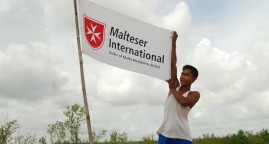Interview with Pedro Medrano Rojas, UN Senior Coordinator for the Cholera Response in Haiti
03/04/2015. Despite severe infrastructure and financial constraints, concerted efforts by Haiti and its partners succeeded in drastically reducing the number of reported cholera cases in the country – down from a peak of over 350,000 reported cases for 2011, to around 28,000 reported cases for 2014
The persistence of cholera in Haiti is mainly due to the lack of access to clean water and appropriate sanitation facilities, and although considerable improvements have been made in this regard, the small Caribbean nation continues to host the largest cholera epidemic in the Western Hemisphere. To date, the epidemic has affected some 725,600 people and claimed over 8,800 lives in Haiti since October 2010.
… And I think that what we are facing now is, as I said before, this perception that because of the progress that has been made, there is no longer an emergency there… and also the other crises around the world. Also, the fact that this is not prominent in the major media, it is not perceived as an emergency. I think that is the purpose of our work. That’s the reason why I am reaching out to partners, Member States, not to forget Haiti. Otherwise, we will continue to have not only the surge we have just mentioned but an increasing number of people affected and also fatalities – that can be avoided, by the way.
Read the interview on the United nation website
Related Articles
5 natural disasters that beg for climate action
Climate hazards are natural events in weather cycles. We are currently witnessing a scale of destruction and devastation that is new and terrifying.
One year after the earthquake in Nepal
04/16/2016. Malteser International plans construction of medical facilities in outlying regions
De fortes inondations dans le sud et le sud-est de l’Asie : la prévention a évité le pire
11/08/2015. Malteser International se mobilise en Birmanie et au Pakistan.



